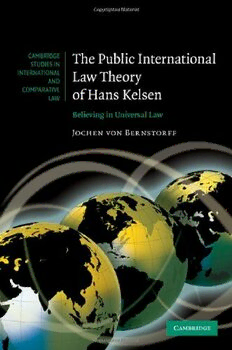
The Public International Law Theory of Hans Kelsen: Believing in Universal Law PDF
Preview The Public International Law Theory of Hans Kelsen: Believing in Universal Law
This page intentionally left blank THE PUBLIC INTERNATIONAL LAW THEORY OF HANS KELSEN ThisanalysisofHansKelsen’sinternationallawtheorytakesintoaccount thecontextoftheGermaninternationallegaldiscourseinthefirsthalfof thetwentiethcentury,includingthereactionsofCarlSchmittandother WeimaropponentsofKelsen.TherelationshipbetweenhisPureTheory ofLawandhisinternationallawwritingsisexamined,enablingthereader tounderstandhowKelsentriedtosquarehisownliberalcosmopolitan projectwithhismethodologicalconvictionsaslaidoutinhisPureTheory ofLaw.Finally,JochenvonBernstorffdiscussesthelimitsandcontinuing relevanceofKelsenianformalismforinternationallawunderthetermof “reflexiveformalism,”andoffersareflectiononKelsen’stheoryofinter- nationallawagainstthebackgroundofcurrentdebatesoverconstitutio- nalization, institutionalization, and fragmentation of international law. The book also includes biographical sketches of Hans Kelsen and his mainstudentsAlfredVerdrossandJosephL.Kunz. Jochen von Bernstorff is a senior fellow of the Max Planck Institute for Comparative Public Law and International Law in HeidelbergandalecturerattheUniversityofFrankfurt.Asalegaladviser intheUNDepartmentoftheGermanFederalForeignOffice,hewasa memberoftheGermandelegationattheCommissiononHumanRights inGenevain2004and2005andtheUNHumanRightsCouncilin2006, as well as a member of the German delegation at the UN General Assemblyin2003,2004and2005inNewYork. cambridge studies in international and comparative law Established in 1946, this series produces high quality scholarship in the fields of public and private international law and comparative law. Although these are distinct legal sub-disciplines, developments since 1946confirmtheirinterrelation. Comparative law is increasingly used as a tool in the making of law at national, regional and international levels. Private international law is now often affected by international conventions, and the issues facedbyclassicalconflictsrulesarefrequentlydealtwithbysubstantive harmonisationoflawunderinternationalauspices.Mixedinternational arbitrations, especially those involving state economic activity, raise mixedquestionsofpublicandprivateinternationallaw,whileinmany fields(suchastheprotectionofhumanrightsanddemocraticstandards, investmentguaranteesandinternationalcriminallaw)internationaland nationalsystemsinteract.Nationalconstitutionalarrangementsrelating to‘foreignaffairs’,andtotheimplementationofinternationalnorms,are afocusofattention. The Board welcomes works of a theoretical or interdisciplinary character, and those focusing on the new approaches to international orcomparativelaworconflictsoflaw.Studiesofparticularinstitutions or problems are equally welcome, as are translations of the best work publishedinotherlanguages. GeneralEditors JamesCrawfordSCFBA WhewellProfessorofInternationalLaw,FacultyofLaw,andDirector,Lauterpacht ResearchCentreforInternationalLaw,UniversityofCambridge JohnS.BellFBA ProfessorofLaw,FacultyofLaw,UniversityofCambridge EditorialBoard ProfessorHilaryCharlesworth AustralianNationalUniversity ProfessorLoriDamrosch ColumbiaUniversityLawSchool ProfessorJohnDugard UniversiteitLeiden ProfessorMary-AnnGlendon HarvardLawSchool ProfessorChristopherGreenwood LondonSchoolofEconomics ProfessorDavidJohnston UniversityofEdinburgh ProfessorHeinKötz Max-Planck-Institut,Hamburg ProfessorDonaldMcRae UniversityofOttawa ProfessorOnumaYasuaki UniversityofTokyo ProfessorReinhardZimmermann UniversitätRegensburg AdvisoryCommittee ProfessorD.W.BowettQC JudgeRosalynHigginsQC ProfessorJ.A.JolowiczQC ProfessorSirElihuLauterpachtCBEQC JudgeStephenSchwebel Alistofbooksintheseriescanbefoundattheendofthisvolume. THE PUBLIC INTERNATIONAL LAW THEORY OF HANS KELSEN Believing in Universal Law JOCHEN VON BERNSTORFF and THOMAS DUNLAP CAMBRIDGE UNIVERSITY PRESS Cambridge, New York, Melbourne, Madrid, Cape Town, Singapore, São Paulo, Delhi, Dubai, Tokyo Cambridge University Press The Edinburgh Building, Cambridge CB2 8RU, UK Published in the United States of America by Cambridge University Press, New York www.cambridge.org Information on this title: www.cambridge.org/9780521516181 © Jochen von Bernstorff 2010 Translated by Thomas Dunlap This publication is in copyright. Subject to statutory exception and to the provision of relevant collective licensing agreements, no reproduction of any part may take place without the written permission of Cambridge University Press. First published in print format 2010 ISBN-13 978-0-511-77646-5 eBook (NetLibrary) ISBN-13 978-0-521-51618-1 Hardback Cambridge University Press has no responsibility for the persistence or accuracy of urls for external or third-party internet websites referred to in this publication, and does not guarantee that any content on such websites is, or will remain, accurate or appropriate. CONTENTS Preface pagexiii Introduction 1 PART I Thequestforobjectivity:themethodand constructionofuniversallaw 13 1 Methodandconstructionofinternationallawin nineteenth-centuryGermanscholarship 15 A Kaltenbornandthe“objectiveprinciple”ofinternational law 15 I The“subjectiveprinciple”inKantandHegel 17 II Humanityasa“communityoflaw”[Rechtsgemeinwesen]in Kaltenborn 18 B BergbohmandFricker:“Theproblemofinternational lawrevisited” 21 C Jellinekassynthesis 26 I Thefreewillofthestateastheformalgroundofalllaw 28 II Theconceptof“self-obligation”[Selbstverpflichtung]and theobligatorynatureofpubliclaw 30 III Thetheoryoftheguaranteednorm 32 IV Jellinek’s“objectiveinternationallaw” 32 1 The“natureofthething”[NaturderSache]asaprinciple ofobjectification 32 2 “Sharedinterests”and“purposeofthestate”asthefinal sociologicalfoundationofobjectiveinternationallaw 35 D HeinrichTriepelandthe“commonwill”[Gemeinwille] asaprincipleofobjectivization 38 Conclusion 42 vii viii contents 2 Kelsenianformalismascriticalmethodologyin internationallaw 44 A Anewmethodologicaltoolkit 44 I Methodologicaldualismasthestartingpoint 45 II Methodologicalcritiquethroughthe“identitythesis” 50 III Theanti-ideologicalthrustofthenew methodology 54 B Thefunctionofthecriticalmethodology:lawas auniversalmediumforshapingsociety 56 I Volk,nation,andstateininternationallaw 56 II Lawasauniversalmediumofsocietalchange 60 C Thefundamentalcritiqueoftheconceptualapparatus ofinternationallaw 61 I Theconceptualuncouplingofthenotionofsovereignty fromthe“stateasalegalpersonofwill”[willensfähige Staatsperson] 61 1 Critiqueoftheconceptionofsovereigntyasacorestock ofstatecompetencies 63 2 Sovereigntyasahierarchy-creating,orderingelement ofthelegalsystem 64 II Thecritiqueofthedoctrineofself-obligation 67 III Thecritiqueofadualismofstatelawandinternational law 70 1 Acrititueofthedualityofsources 70 2 Acritiqueofthedualityofregulatoryobjects 71 D Theopponentsofthecriticalmethod:Kelsen’s abstractconceptualworldasa“radical-logicistic metaphysics” 73 3 An“objective”architectureofinternationallaw:Kelsen, Kunz,andVerdross 78 A Constructingaunitarysystem 78 I Systemicunityasanepistemological postulate 79 II “Delegation”asaunity-creatingstructural principle 80 III Theideaofunityinthediscourseon internationallaw 82
